Exploring Life Events Impact: Health and Social Care Support Analysis
VerifiedAdded on 2024/07/01
|9
|1914
|227
Report
AI Summary
This report explores the profound impact of significant life events on individuals, encompassing physical, psychological, and social dimensions, with a specific focus on the responsibilities of health and social care workers. It analyzes individual and group responses to such events, using the case study of Jacqui, an artist with Alzheimer's, to illustrate the challenges and consequences. The report further examines organizational responses to support affected individuals and reflects on personal contributions to this support. Recommendations are made for improving support systems within health and social care organizations, emphasizing the need for tailored approaches, transparency, and family involvement. The conclusion highlights the importance of understanding and addressing the diverse impacts of life events to enhance the quality of life for those affected, emphasizing that Desklib offers a range of resources, including past papers and solved assignments, to aid students in their studies.
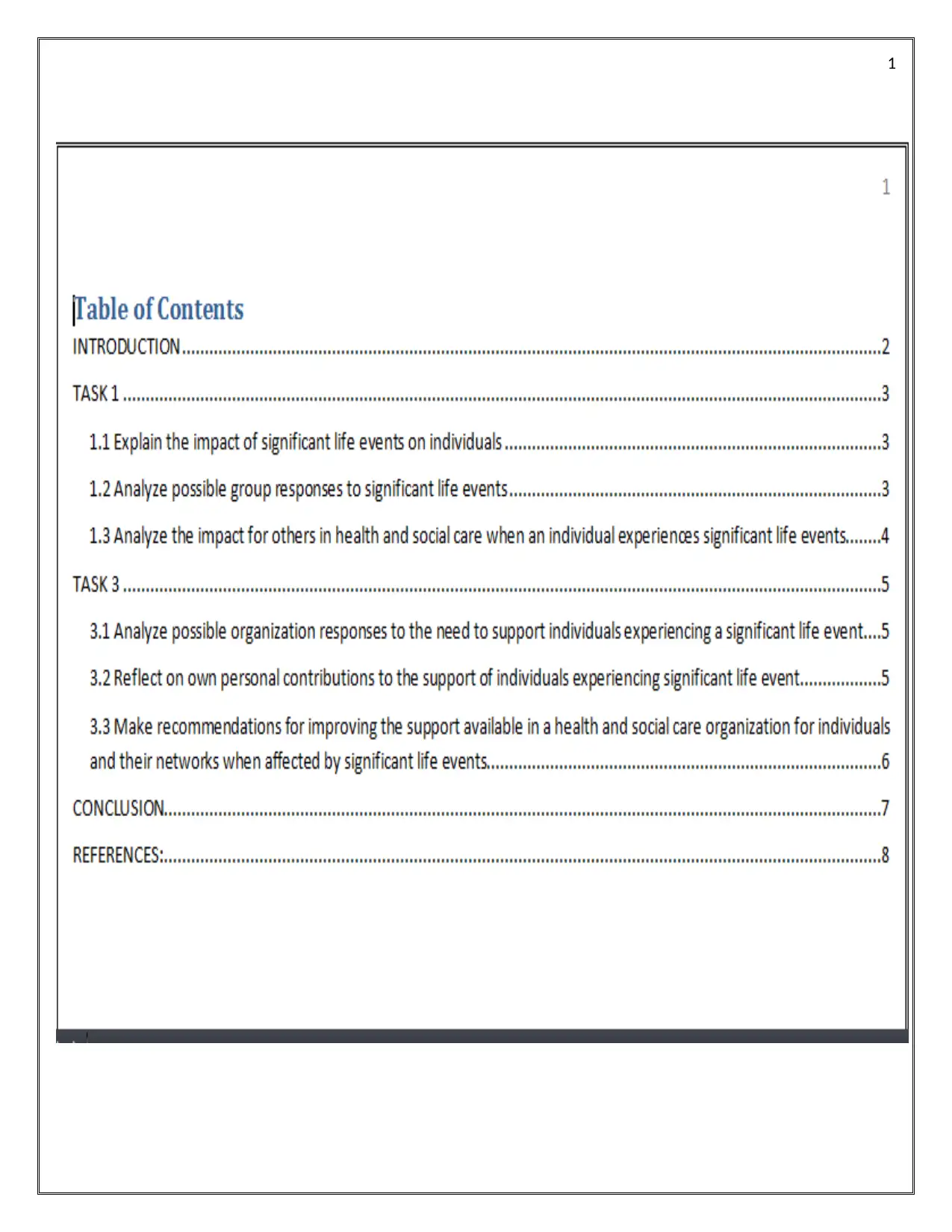
1
Paraphrase This Document
Need a fresh take? Get an instant paraphrase of this document with our AI Paraphraser
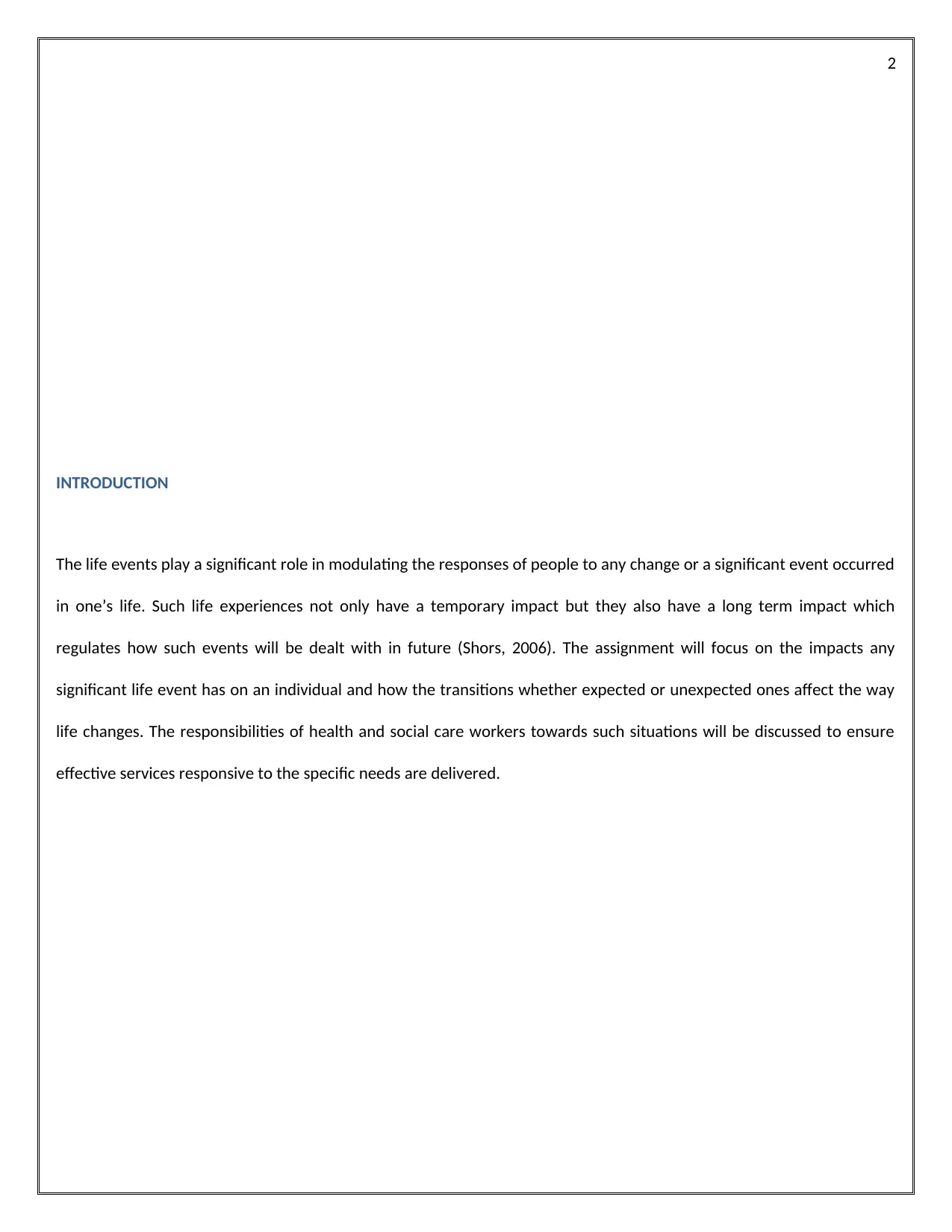
2
INTRODUCTION
The life events play a significant role in modulating the responses of people to any change or a significant event occurred
in one’s life. Such life experiences not only have a temporary impact but they also have a long term impact which
regulates how such events will be dealt with in future (Shors, 2006). The assignment will focus on the impacts any
significant life event has on an individual and how the transitions whether expected or unexpected ones affect the way
life changes. The responsibilities of health and social care workers towards such situations will be discussed to ensure
effective services responsive to the specific needs are delivered.
INTRODUCTION
The life events play a significant role in modulating the responses of people to any change or a significant event occurred
in one’s life. Such life experiences not only have a temporary impact but they also have a long term impact which
regulates how such events will be dealt with in future (Shors, 2006). The assignment will focus on the impacts any
significant life event has on an individual and how the transitions whether expected or unexpected ones affect the way
life changes. The responsibilities of health and social care workers towards such situations will be discussed to ensure
effective services responsive to the specific needs are delivered.
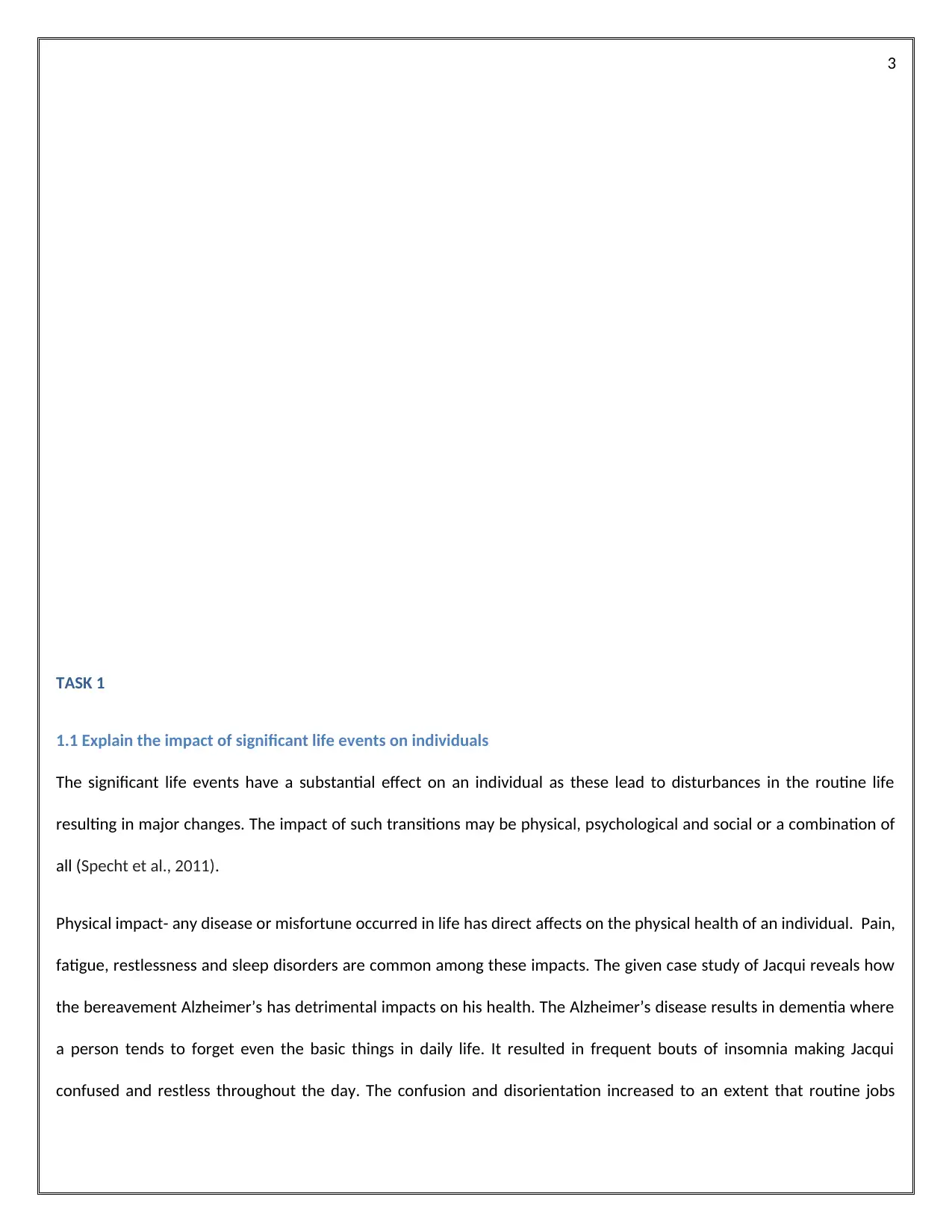
3
TASK 1
1.1 Explain the impact of significant life events on individuals
The significant life events have a substantial effect on an individual as these lead to disturbances in the routine life
resulting in major changes. The impact of such transitions may be physical, psychological and social or a combination of
all (Specht et al., 2011).
Physical impact- any disease or misfortune occurred in life has direct affects on the physical health of an individual. Pain,
fatigue, restlessness and sleep disorders are common among these impacts. The given case study of Jacqui reveals how
the bereavement Alzheimer’s has detrimental impacts on his health. The Alzheimer’s disease results in dementia where
a person tends to forget even the basic things in daily life. It resulted in frequent bouts of insomnia making Jacqui
confused and restless throughout the day. The confusion and disorientation increased to an extent that routine jobs
TASK 1
1.1 Explain the impact of significant life events on individuals
The significant life events have a substantial effect on an individual as these lead to disturbances in the routine life
resulting in major changes. The impact of such transitions may be physical, psychological and social or a combination of
all (Specht et al., 2011).
Physical impact- any disease or misfortune occurred in life has direct affects on the physical health of an individual. Pain,
fatigue, restlessness and sleep disorders are common among these impacts. The given case study of Jacqui reveals how
the bereavement Alzheimer’s has detrimental impacts on his health. The Alzheimer’s disease results in dementia where
a person tends to forget even the basic things in daily life. It resulted in frequent bouts of insomnia making Jacqui
confused and restless throughout the day. The confusion and disorientation increased to an extent that routine jobs
⊘ This is a preview!⊘
Do you want full access?
Subscribe today to unlock all pages.

Trusted by 1+ million students worldwide
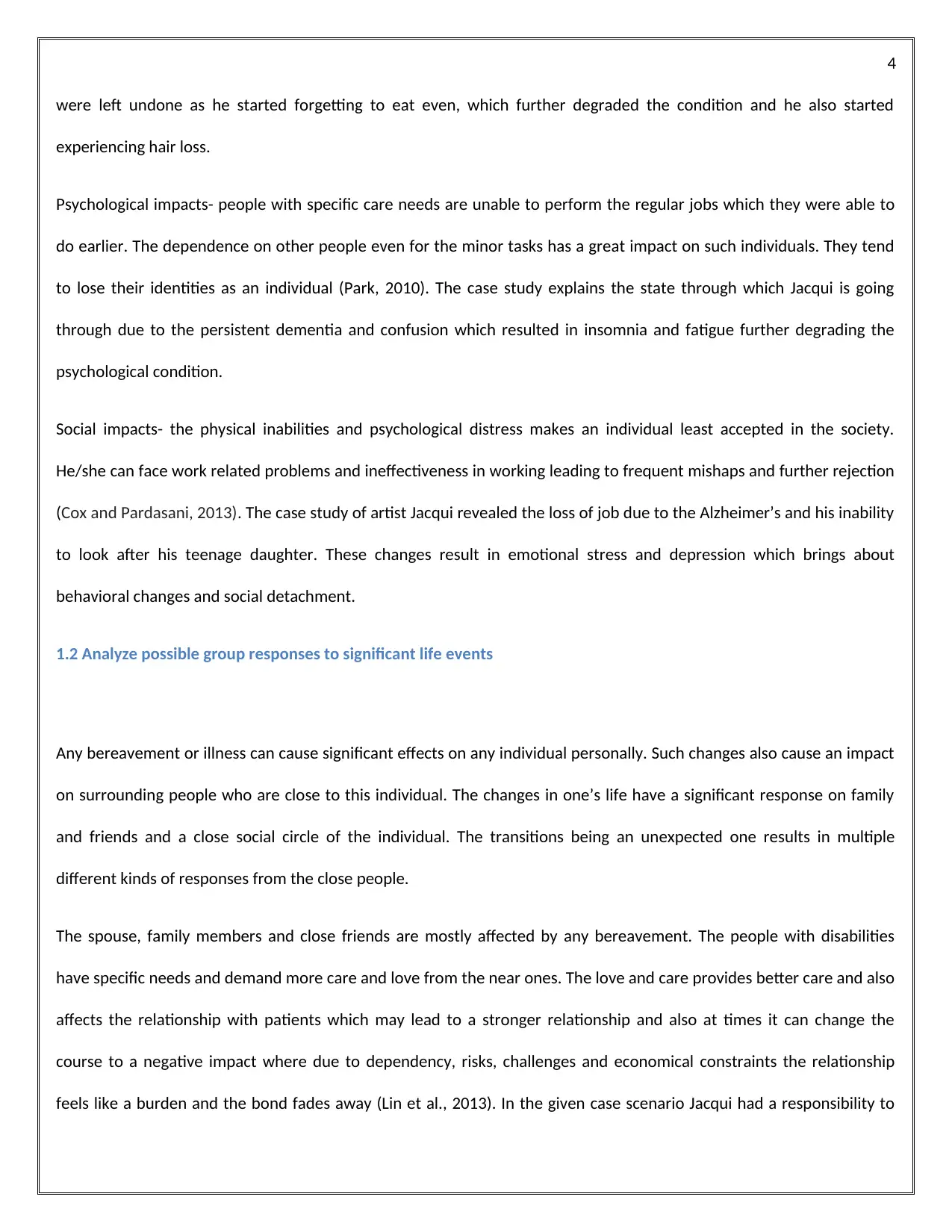
4
were left undone as he started forgetting to eat even, which further degraded the condition and he also started
experiencing hair loss.
Psychological impacts- people with specific care needs are unable to perform the regular jobs which they were able to
do earlier. The dependence on other people even for the minor tasks has a great impact on such individuals. They tend
to lose their identities as an individual (Park, 2010). The case study explains the state through which Jacqui is going
through due to the persistent dementia and confusion which resulted in insomnia and fatigue further degrading the
psychological condition.
Social impacts- the physical inabilities and psychological distress makes an individual least accepted in the society.
He/she can face work related problems and ineffectiveness in working leading to frequent mishaps and further rejection
(Cox and Pardasani, 2013). The case study of artist Jacqui revealed the loss of job due to the Alzheimer’s and his inability
to look after his teenage daughter. These changes result in emotional stress and depression which brings about
behavioral changes and social detachment.
1.2 Analyze possible group responses to significant life events
Any bereavement or illness can cause significant effects on any individual personally. Such changes also cause an impact
on surrounding people who are close to this individual. The changes in one’s life have a significant response on family
and friends and a close social circle of the individual. The transitions being an unexpected one results in multiple
different kinds of responses from the close people.
The spouse, family members and close friends are mostly affected by any bereavement. The people with disabilities
have specific needs and demand more care and love from the near ones. The love and care provides better care and also
affects the relationship with patients which may lead to a stronger relationship and also at times it can change the
course to a negative impact where due to dependency, risks, challenges and economical constraints the relationship
feels like a burden and the bond fades away (Lin et al., 2013). In the given case scenario Jacqui had a responsibility to
were left undone as he started forgetting to eat even, which further degraded the condition and he also started
experiencing hair loss.
Psychological impacts- people with specific care needs are unable to perform the regular jobs which they were able to
do earlier. The dependence on other people even for the minor tasks has a great impact on such individuals. They tend
to lose their identities as an individual (Park, 2010). The case study explains the state through which Jacqui is going
through due to the persistent dementia and confusion which resulted in insomnia and fatigue further degrading the
psychological condition.
Social impacts- the physical inabilities and psychological distress makes an individual least accepted in the society.
He/she can face work related problems and ineffectiveness in working leading to frequent mishaps and further rejection
(Cox and Pardasani, 2013). The case study of artist Jacqui revealed the loss of job due to the Alzheimer’s and his inability
to look after his teenage daughter. These changes result in emotional stress and depression which brings about
behavioral changes and social detachment.
1.2 Analyze possible group responses to significant life events
Any bereavement or illness can cause significant effects on any individual personally. Such changes also cause an impact
on surrounding people who are close to this individual. The changes in one’s life have a significant response on family
and friends and a close social circle of the individual. The transitions being an unexpected one results in multiple
different kinds of responses from the close people.
The spouse, family members and close friends are mostly affected by any bereavement. The people with disabilities
have specific needs and demand more care and love from the near ones. The love and care provides better care and also
affects the relationship with patients which may lead to a stronger relationship and also at times it can change the
course to a negative impact where due to dependency, risks, challenges and economical constraints the relationship
feels like a burden and the bond fades away (Lin et al., 2013). In the given case scenario Jacqui had a responsibility to
Paraphrase This Document
Need a fresh take? Get an instant paraphrase of this document with our AI Paraphraser
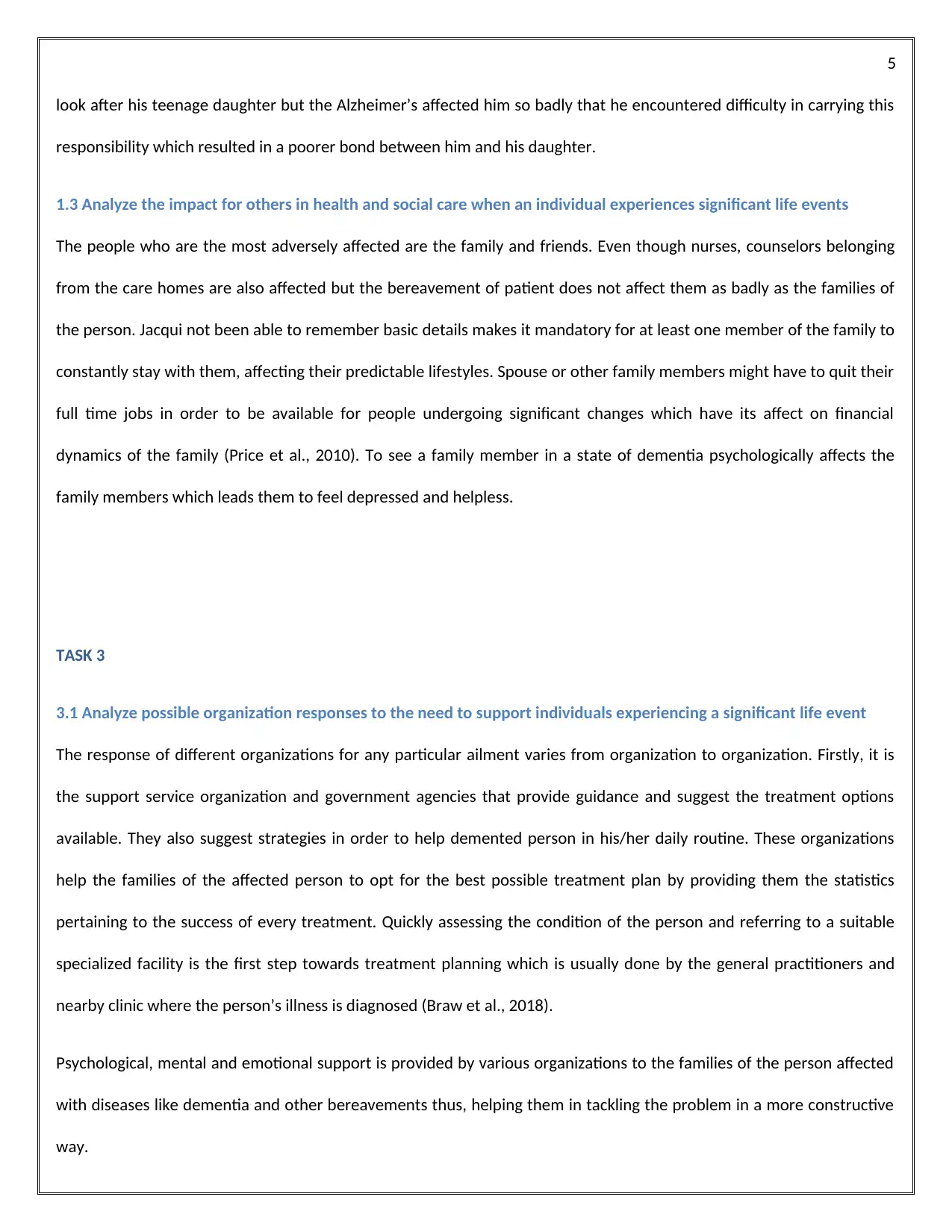
5
look after his teenage daughter but the Alzheimer’s affected him so badly that he encountered difficulty in carrying this
responsibility which resulted in a poorer bond between him and his daughter.
1.3 Analyze the impact for others in health and social care when an individual experiences significant life events
The people who are the most adversely affected are the family and friends. Even though nurses, counselors belonging
from the care homes are also affected but the bereavement of patient does not affect them as badly as the families of
the person. Jacqui not been able to remember basic details makes it mandatory for at least one member of the family to
constantly stay with them, affecting their predictable lifestyles. Spouse or other family members might have to quit their
full time jobs in order to be available for people undergoing significant changes which have its affect on financial
dynamics of the family (Price et al., 2010). To see a family member in a state of dementia psychologically affects the
family members which leads them to feel depressed and helpless.
TASK 3
3.1 Analyze possible organization responses to the need to support individuals experiencing a significant life event
The response of different organizations for any particular ailment varies from organization to organization. Firstly, it is
the support service organization and government agencies that provide guidance and suggest the treatment options
available. They also suggest strategies in order to help demented person in his/her daily routine. These organizations
help the families of the affected person to opt for the best possible treatment plan by providing them the statistics
pertaining to the success of every treatment. Quickly assessing the condition of the person and referring to a suitable
specialized facility is the first step towards treatment planning which is usually done by the general practitioners and
nearby clinic where the person’s illness is diagnosed (Braw et al., 2018).
Psychological, mental and emotional support is provided by various organizations to the families of the person affected
with diseases like dementia and other bereavements thus, helping them in tackling the problem in a more constructive
way.
look after his teenage daughter but the Alzheimer’s affected him so badly that he encountered difficulty in carrying this
responsibility which resulted in a poorer bond between him and his daughter.
1.3 Analyze the impact for others in health and social care when an individual experiences significant life events
The people who are the most adversely affected are the family and friends. Even though nurses, counselors belonging
from the care homes are also affected but the bereavement of patient does not affect them as badly as the families of
the person. Jacqui not been able to remember basic details makes it mandatory for at least one member of the family to
constantly stay with them, affecting their predictable lifestyles. Spouse or other family members might have to quit their
full time jobs in order to be available for people undergoing significant changes which have its affect on financial
dynamics of the family (Price et al., 2010). To see a family member in a state of dementia psychologically affects the
family members which leads them to feel depressed and helpless.
TASK 3
3.1 Analyze possible organization responses to the need to support individuals experiencing a significant life event
The response of different organizations for any particular ailment varies from organization to organization. Firstly, it is
the support service organization and government agencies that provide guidance and suggest the treatment options
available. They also suggest strategies in order to help demented person in his/her daily routine. These organizations
help the families of the affected person to opt for the best possible treatment plan by providing them the statistics
pertaining to the success of every treatment. Quickly assessing the condition of the person and referring to a suitable
specialized facility is the first step towards treatment planning which is usually done by the general practitioners and
nearby clinic where the person’s illness is diagnosed (Braw et al., 2018).
Psychological, mental and emotional support is provided by various organizations to the families of the person affected
with diseases like dementia and other bereavements thus, helping them in tackling the problem in a more constructive
way.
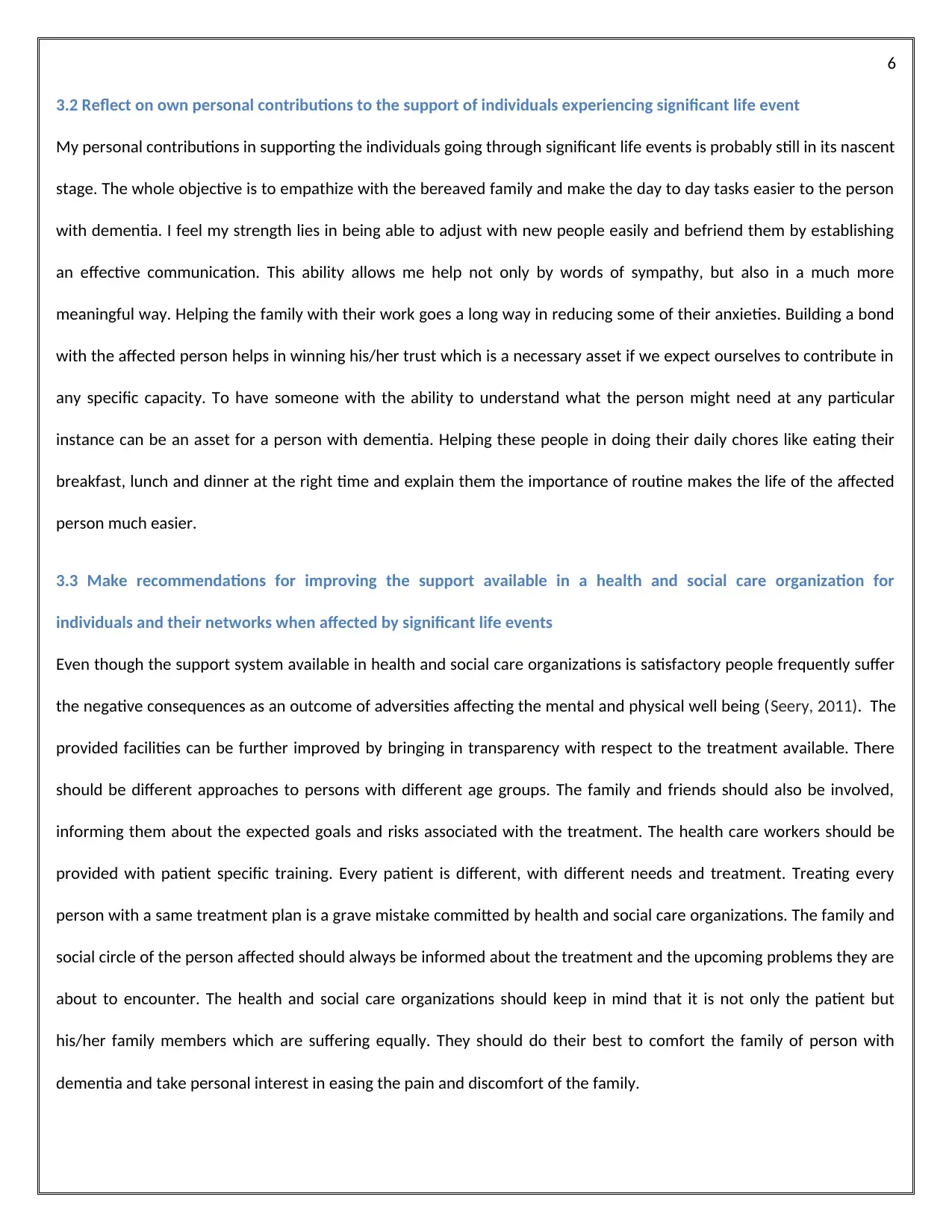
6
3.2 Reflect on own personal contributions to the support of individuals experiencing significant life event
My personal contributions in supporting the individuals going through significant life events is probably still in its nascent
stage. The whole objective is to empathize with the bereaved family and make the day to day tasks easier to the person
with dementia. I feel my strength lies in being able to adjust with new people easily and befriend them by establishing
an effective communication. This ability allows me help not only by words of sympathy, but also in a much more
meaningful way. Helping the family with their work goes a long way in reducing some of their anxieties. Building a bond
with the affected person helps in winning his/her trust which is a necessary asset if we expect ourselves to contribute in
any specific capacity. To have someone with the ability to understand what the person might need at any particular
instance can be an asset for a person with dementia. Helping these people in doing their daily chores like eating their
breakfast, lunch and dinner at the right time and explain them the importance of routine makes the life of the affected
person much easier.
3.3 Make recommendations for improving the support available in a health and social care organization for
individuals and their networks when affected by significant life events
Even though the support system available in health and social care organizations is satisfactory people frequently suffer
the negative consequences as an outcome of adversities affecting the mental and physical well being (Seery, 2011). The
provided facilities can be further improved by bringing in transparency with respect to the treatment available. There
should be different approaches to persons with different age groups. The family and friends should also be involved,
informing them about the expected goals and risks associated with the treatment. The health care workers should be
provided with patient specific training. Every patient is different, with different needs and treatment. Treating every
person with a same treatment plan is a grave mistake committed by health and social care organizations. The family and
social circle of the person affected should always be informed about the treatment and the upcoming problems they are
about to encounter. The health and social care organizations should keep in mind that it is not only the patient but
his/her family members which are suffering equally. They should do their best to comfort the family of person with
dementia and take personal interest in easing the pain and discomfort of the family.
3.2 Reflect on own personal contributions to the support of individuals experiencing significant life event
My personal contributions in supporting the individuals going through significant life events is probably still in its nascent
stage. The whole objective is to empathize with the bereaved family and make the day to day tasks easier to the person
with dementia. I feel my strength lies in being able to adjust with new people easily and befriend them by establishing
an effective communication. This ability allows me help not only by words of sympathy, but also in a much more
meaningful way. Helping the family with their work goes a long way in reducing some of their anxieties. Building a bond
with the affected person helps in winning his/her trust which is a necessary asset if we expect ourselves to contribute in
any specific capacity. To have someone with the ability to understand what the person might need at any particular
instance can be an asset for a person with dementia. Helping these people in doing their daily chores like eating their
breakfast, lunch and dinner at the right time and explain them the importance of routine makes the life of the affected
person much easier.
3.3 Make recommendations for improving the support available in a health and social care organization for
individuals and their networks when affected by significant life events
Even though the support system available in health and social care organizations is satisfactory people frequently suffer
the negative consequences as an outcome of adversities affecting the mental and physical well being (Seery, 2011). The
provided facilities can be further improved by bringing in transparency with respect to the treatment available. There
should be different approaches to persons with different age groups. The family and friends should also be involved,
informing them about the expected goals and risks associated with the treatment. The health care workers should be
provided with patient specific training. Every patient is different, with different needs and treatment. Treating every
person with a same treatment plan is a grave mistake committed by health and social care organizations. The family and
social circle of the person affected should always be informed about the treatment and the upcoming problems they are
about to encounter. The health and social care organizations should keep in mind that it is not only the patient but
his/her family members which are suffering equally. They should do their best to comfort the family of person with
dementia and take personal interest in easing the pain and discomfort of the family.
⊘ This is a preview!⊘
Do you want full access?
Subscribe today to unlock all pages.

Trusted by 1+ million students worldwide
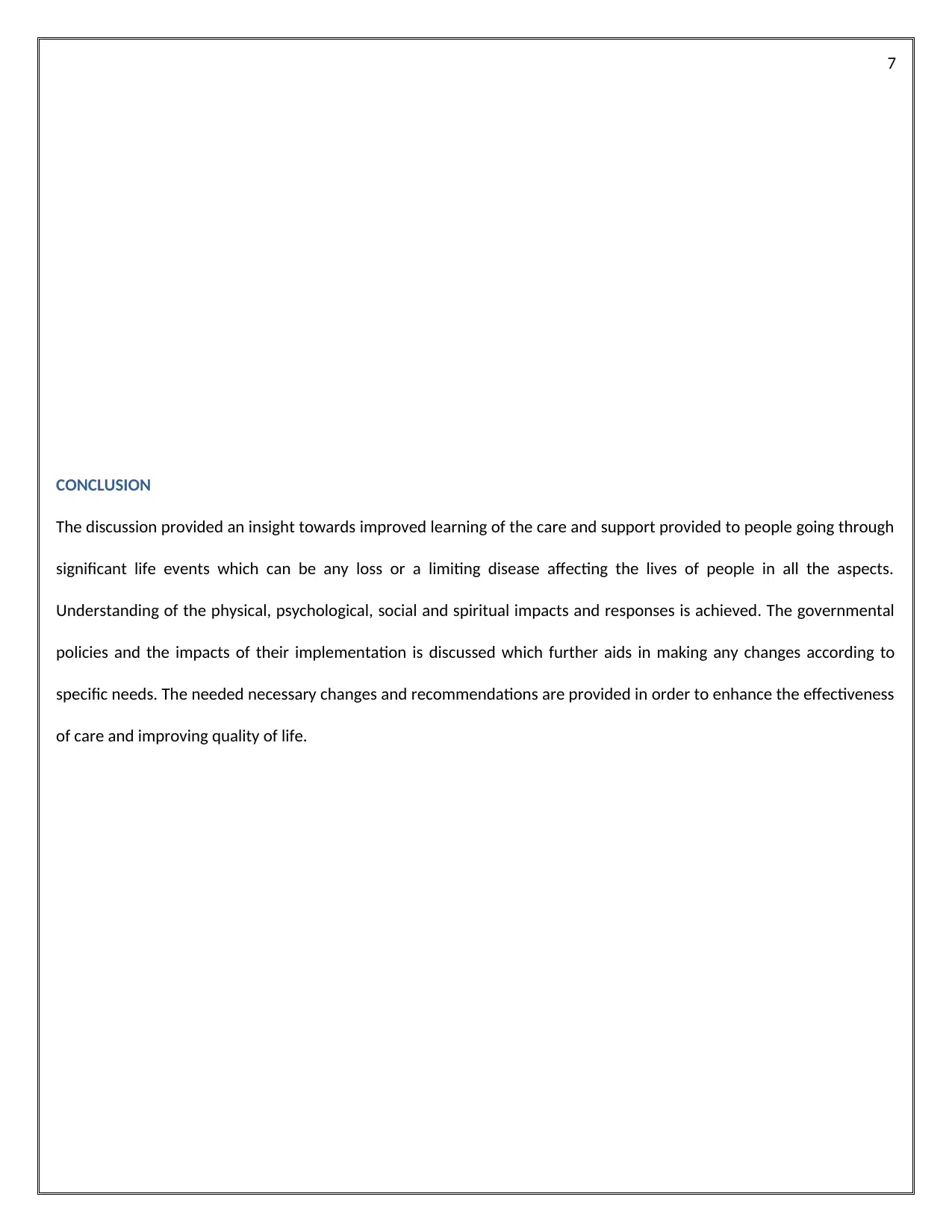
7
CONCLUSION
The discussion provided an insight towards improved learning of the care and support provided to people going through
significant life events which can be any loss or a limiting disease affecting the lives of people in all the aspects.
Understanding of the physical, psychological, social and spiritual impacts and responses is achieved. The governmental
policies and the impacts of their implementation is discussed which further aids in making any changes according to
specific needs. The needed necessary changes and recommendations are provided in order to enhance the effectiveness
of care and improving quality of life.
CONCLUSION
The discussion provided an insight towards improved learning of the care and support provided to people going through
significant life events which can be any loss or a limiting disease affecting the lives of people in all the aspects.
Understanding of the physical, psychological, social and spiritual impacts and responses is achieved. The governmental
policies and the impacts of their implementation is discussed which further aids in making any changes according to
specific needs. The needed necessary changes and recommendations are provided in order to enhance the effectiveness
of care and improving quality of life.
Paraphrase This Document
Need a fresh take? Get an instant paraphrase of this document with our AI Paraphraser
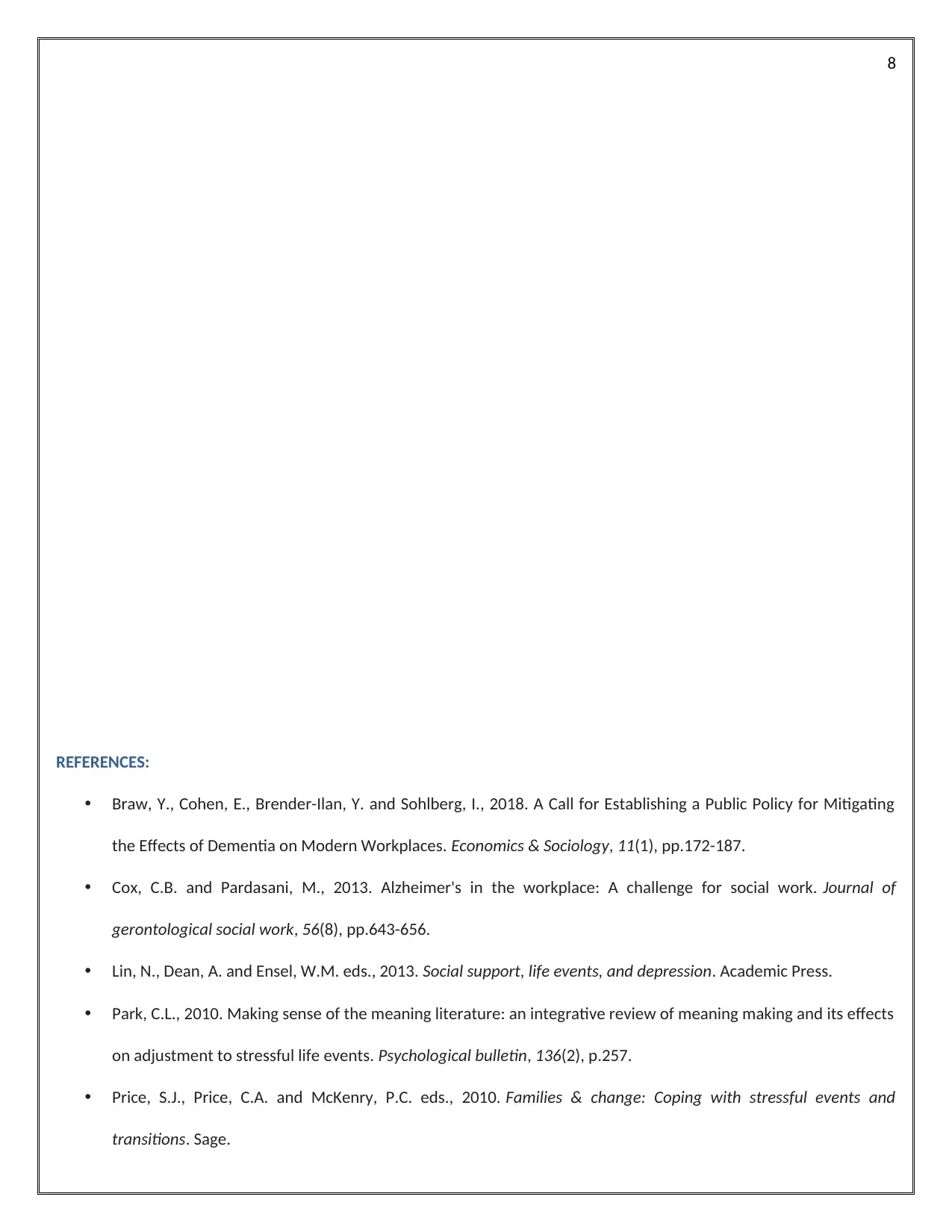
8
REFERENCES:
Braw, Y., Cohen, E., Brender-Ilan, Y. and Sohlberg, I., 2018. A Call for Establishing a Public Policy for Mitigating
the Effects of Dementia on Modern Workplaces. Economics & Sociology, 11(1), pp.172-187.
Cox, C.B. and Pardasani, M., 2013. Alzheimer's in the workplace: A challenge for social work. Journal of
gerontological social work, 56(8), pp.643-656.
Lin, N., Dean, A. and Ensel, W.M. eds., 2013. Social support, life events, and depression. Academic Press.
Park, C.L., 2010. Making sense of the meaning literature: an integrative review of meaning making and its effects
on adjustment to stressful life events. Psychological bulletin, 136(2), p.257.
Price, S.J., Price, C.A. and McKenry, P.C. eds., 2010. Families & change: Coping with stressful events and
transitions. Sage.
REFERENCES:
Braw, Y., Cohen, E., Brender-Ilan, Y. and Sohlberg, I., 2018. A Call for Establishing a Public Policy for Mitigating
the Effects of Dementia on Modern Workplaces. Economics & Sociology, 11(1), pp.172-187.
Cox, C.B. and Pardasani, M., 2013. Alzheimer's in the workplace: A challenge for social work. Journal of
gerontological social work, 56(8), pp.643-656.
Lin, N., Dean, A. and Ensel, W.M. eds., 2013. Social support, life events, and depression. Academic Press.
Park, C.L., 2010. Making sense of the meaning literature: an integrative review of meaning making and its effects
on adjustment to stressful life events. Psychological bulletin, 136(2), p.257.
Price, S.J., Price, C.A. and McKenry, P.C. eds., 2010. Families & change: Coping with stressful events and
transitions. Sage.
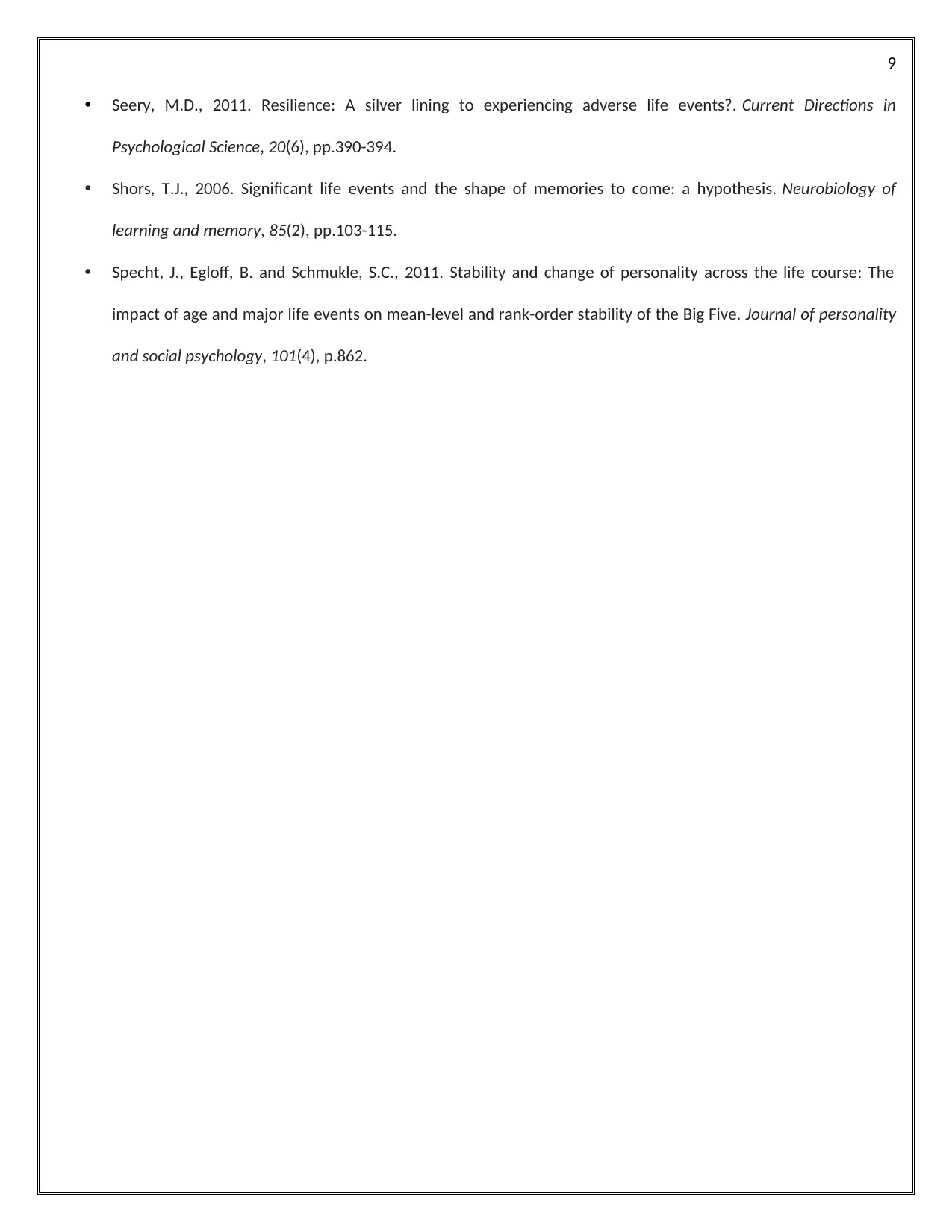
9
Seery, M.D., 2011. Resilience: A silver lining to experiencing adverse life events?. Current Directions in
Psychological Science, 20(6), pp.390-394.
Shors, T.J., 2006. Significant life events and the shape of memories to come: a hypothesis. Neurobiology of
learning and memory, 85(2), pp.103-115.
Specht, J., Egloff, B. and Schmukle, S.C., 2011. Stability and change of personality across the life course: The
impact of age and major life events on mean-level and rank-order stability of the Big Five. Journal of personality
and social psychology, 101(4), p.862.
Seery, M.D., 2011. Resilience: A silver lining to experiencing adverse life events?. Current Directions in
Psychological Science, 20(6), pp.390-394.
Shors, T.J., 2006. Significant life events and the shape of memories to come: a hypothesis. Neurobiology of
learning and memory, 85(2), pp.103-115.
Specht, J., Egloff, B. and Schmukle, S.C., 2011. Stability and change of personality across the life course: The
impact of age and major life events on mean-level and rank-order stability of the Big Five. Journal of personality
and social psychology, 101(4), p.862.
⊘ This is a preview!⊘
Do you want full access?
Subscribe today to unlock all pages.

Trusted by 1+ million students worldwide
1 out of 9
Related Documents
Your All-in-One AI-Powered Toolkit for Academic Success.
+13062052269
info@desklib.com
Available 24*7 on WhatsApp / Email
![[object Object]](/_next/static/media/star-bottom.7253800d.svg)
Unlock your academic potential
Copyright © 2020–2026 A2Z Services. All Rights Reserved. Developed and managed by ZUCOL.




